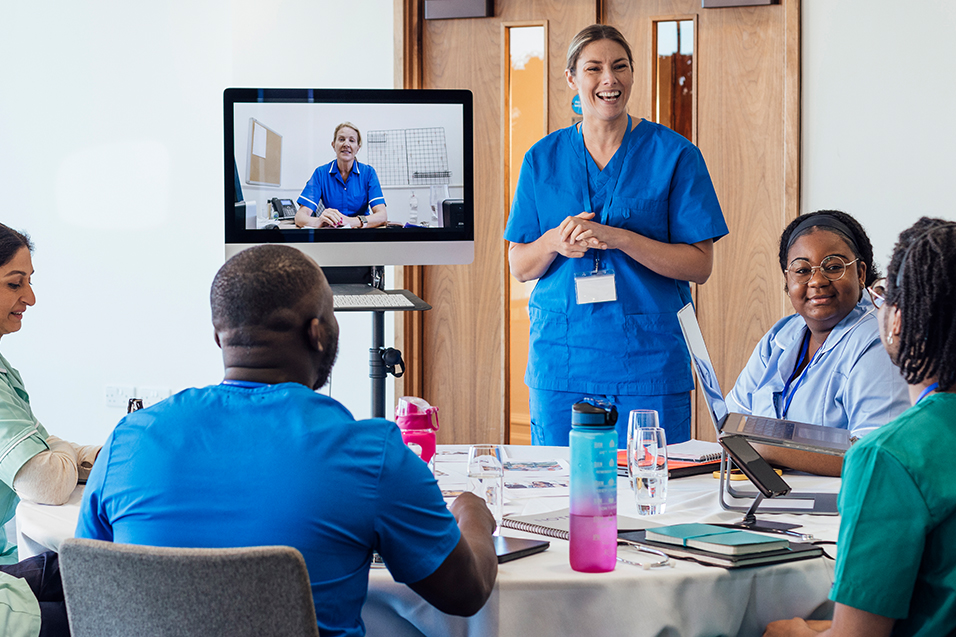Insights
5 ways to close the 10-year digital gap in the NHS
5 minutes
07th November 2024
Share this article:
How do we close the digital divide in the NHS?
Whether down to a lack of access to tech or the skills or confidence to use it, some patients and staff are unable to use crucial healthcare services.
34% of NHS decision-makers believe it could take up to 10 years to rectify this issue, according to our recent report ‘Bridging the digital gap in UK healthcare’.
Despite the enormous progress the NHS has made in digitalisation, it is clear that there is work to do to maintain momentum towards ensuring technology can be accessed by everyone.
That’s why Mark Burton, our Health and Social Care lead, sat down with Digital Health to discuss digital skills on a recent episode of Digital Health Unplugged.
He shared his thoughts on what integrated care boards (ICBs) can do to ensure the healthcare they deliver is seamless, integrated and, most importantly, accessible.
Here are five steps you can take to help close the digital divide.
1) Prioritise your infrastructure
Making meaningful progress first hinges on improving connectivity and ensuring healthcare facilities have faster, more reliable access to data.
96% of trusts have some element of inefficient technology, according to our ‘Public Sector Tech Untapped’ report, showing there is clearly more work to be done.
When healthcare professionals struggle to retrieve patient records or vital information, it not only causes frustration but can also determine whether a patient is seen or treated in a timely manner.
Robust connectivity, wherever your workforce needs it, can be the difference between prompt care or delayed treatment. This has a direct impact on patient outcomes.
So take the time now to address inefficiencies or legacy infrastructure, not just to deliver the best care to patients but also to improve the experience your employees have and reduce their admin.
2) Improve your interoperability with the cloud
ICBs don’t work alone. Addressing data flow issues means thinking about the NHS as an ecosystem of shared information.
Cloud-based technology can have a huge impact on the seamlessness, access and security of that data, ensuring it is accessible even across different ICBs with different patient data transfer and referral processes.
This allows for better collaboration and communication between staff across ICBs, leading to a more joined-up approach to care.
There are obstacles to implementing this cloud-based approach, most notably around investment.
49% of trusts say limited investment is a barrier to digital transformation, according to our healthcare report.
But cloud services have the benefit of being scalable, with reactive data speeds that can flex up and down depending on your usage. This flexibility reduces your upfront investment, meaning you can find the right fit for your use case and budget.
Whether you need simple data sharing tools or an entire database refit, challenge your digital partner to find a solution that works for you and your situation.
Armed with a robust infrastructure and confident and capable staff, you can then focus on ensuring your patients can access your services in the most effective ways.
3) Collaborate with tech partners
How can you ensure the steps you’re taking will have a meaningful impact on the patients you serve?
To address connectivity issues, it’s important to collaborate with your technology suppliers. They are key to helping you improve the efficiency and speed of your network.
By helping you evaluate your current tech stack to identify areas where existing tools can be optimised or used more effectively, tech partners can identify how to optimise delivery efficiency and prioritise investment for maximum value.
This forward thinking is crucial, especially when it can help you identify areas where staff can be upskilled on the technology already in place.
Given the current financial pressures that the NHS faces, focus should be on maximising the potential of existing technology before scaling further, and partnering with technology suppliers is the best and most cost-effective way to achieve this.
4) Get inspired by healthcare innovations
In 2021, the NHS website had 10 million users. Following the Covid-19 pandemic, this number has surged, with 34 million people downloading the NHS app in 2024.
By putting patients at the centre of their own care, the NHS is ensuring that it can match the right care to the people that need it.
But mobile apps are only useful to those with the skills, confidence and devices to access them. To ensure the services you provide are accessible, think about how you can deliver digital skills training to communities in need.
Our Connect More programme is a prime example of how you can break down the barriers with the public to share knowledge and expertise.
Rolled out to the NHS in the Manchester area, the programme allows staff to dedicate five working days to deliver volunteer digital skills sessions, such as educating patients on how to use the NHS app.
Thanks to this initiative, The Park Medical practice in Greater Manchester has seen 352 more repeat prescriptions ordered via the NHS App per month.
The practice estimates that the shift to mobile prescription ordering has saved staff 17 hours a month, equating to two working days.
Get inspired by initiatives like this to see how digital skills can deliver win-win scenarios for patients and staff alike.
5) Encourage upskilling for the long term
As well as improving access for patients, it’s crucial to empower staff and foster a culture of knowledge sharing.
61% of healthcare leaders believe digital skills are crucial to NHS staff.
But 25% believe their teams don’t have the digital skills to use new technology or are resistant to the training required.
When rolling out new solutions, it’s important to ask yourself: will everyone be able to access them? Are they user friendly? Are there guides or support you can offer to help staff use them?
And with the rate of digital innovation at an all-time high, employees need regular and consistent upskilling so they can keep up.
This doesn’t just help boost productivity – it can free employees up from menial tasks to focus on delivering the best patient care.
86% agree that digital technology can substantially alleviate frontline staff workload, according to our research. This leads to happier and more motivated employees, making it easier to retain the talent at the heart of the NHS.
Cultivating a digital culture can help you implement this crucial training by embedding digital skills into the fabric of your ICB.
Because addressing the digital divide isn’t about simple fixes. It’s about taking a holistic approach to tech integration across the NHS and identifying simple and effective ways to reach more patients and enable them to access the best possible care.
Technology has already helped the NHS deliver crucial services to patients across the UK. Together, we can achieve even more.
Ready to see how technology can help you reach your patients?
Listen to the full Digital Health Unplugged podcast now.
Or speak to one of our experts to learn more about our care-ready connectivity solutions.
Want to speak to one of the team?
call 0800 064 3790


